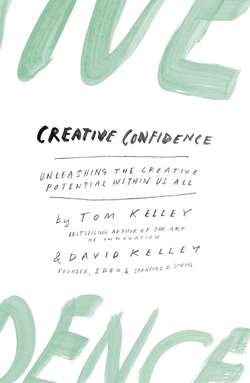Читать книгу Creative Confidence: Unleashing the Creative Potential Within Us All - David Kelley - Страница 25
EMBRACE YOUR FAILURES
ОглавлениеAn old proverb reminds us that “success has many fathers, but failure is an orphan.” To learn from failure, however, you have to “own” it. You have to figure out what went wrong and what to do better next time. If you don’t, you’re liable to repeat your errors in the future.
Acknowledging mistakes is also important for moving on. In doing so, you not only sidestep the psychological pitfalls of cover-up, rationalization, and guilt; you may also find that you enhance your own brand through your honesty, candor, and humility.
Ask financial services professionals about their recent performance, and you are likely to hear a lot of “spin,” as they either ignore their losses or cloud them with phrases like “market corrections” or “industry downdrafts.” Nonetheless, one of our favorite examples of a company owning its failures comes from financial services. Bessemer Venture Partners is a well-respected, hundred-year-old venture capital firm that has gotten in on the ground floor of some stellar growth companies. Their website predictably features their “Top Exits.” What’s refreshing and not so predictable is that one click away from these mega-successes is a catalog of miscues and failed foresight Bessemer calls their “Anti-Portfolio.” As Bessemer explains, their “long and storied history has afforded our firm an unparalleled number of opportunities to completely screw up.” One of their partners passed over a chance to invest in the Series A round of PayPal, which sold a few years later for $1.5 billion. The firm also passed—seven times—on the chance to invest in FedEx, currently worth over $30 billion.
One of the firm’s strongest advocates for the “Anti-Portfolio” idea, partner David Cowan, plays a starring role in its stories of missed opportunities and failures. A former neighbor of Tom’s, Cowan lived within walking distance from the Silicon Valley garage where Larry Page and Sergey Brin started Google. Cowan was good friends with the woman who rented them the garage, and she tried to introduce him one day to these “two really smart Stanford students writing a search engine.” Cowan’s response: “How can I get out of this house without going anywhere near your garage?”
Bessemer’s Anti-Portfolio is part of a trend among enlightened individuals and organizations who want to shine a bright light on their mistakes and learn from that dispassionate observation. The Forbes Midas List ranks Cowan among the top venture capitalists in the world for turning startup investments into gold. Could owning up to his failures have cleared the path for his out-sized success?
Look around, and you will see other signs of this shift in thinking. Failure conferences are cropping up in Silicon Valley and elsewhere. Author and educator Tina Seelig asks her students to write a “failure résumé” that highlights their biggest defeats and screw-ups. She says that smart people accustomed to promoting their successes find it very challenging. In the process of compiling their failure résumé, however, they come to own their setbacks, both emotionally and intellectually.
“Viewing their experiences through the lens of failure forces them to come to terms with the mistakes they have made along the way,” Tina writes in her book What I Wish I Knew When I Was 20. She is brave enough to include her own failure résumé, pointing out missteps such as not paying attention to company culture early in her career and avoiding conflicts in personal relationships. Now more aware and open about her early shortcomings, Tina is not held back by them. She’s the executive director of the Stanford Technology Ventures Program, nurturing tomorrow’s entrepreneurial leaders.
